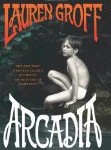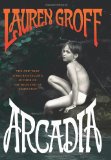Five words from the blurb: commune, mansion, utopian, idealists, dream
On the surface Arcadia is about life in an American commune during the 1970s, but on completion I realised it is about much more than that. This book questions our priorities – the way we choose to live our lives and how technology can be both a positive and a negative for society.
The book begins with the birth of Bit (a nickname given to him because of his small size) and follows him through his childhood in the commune. His happy life in the crumbling mansion they inhabit is marred only slightly by the behaviour of the adults around him. In the second half of the book we see his adult life, away from his shelter of the isolated community. It is only with the benefit of hindsight that Bit realises the problems of commune life were far greater than he was aware.
The writing was beautiful, with quotable passages scattered throughout:
Childhood is such a delicate tissue; what they had done this morning could snag somewhere in the little ones, make a dull, small pain that will circle back again and again, and hurt them in small ways for the rest of their lives.
Groff’s writing has improved since The Monstors of Templeton, but although the two books are different in terms of style and subject matter, Arcadia retains some of the fairytale-like properties of her debut novel. There is a lightness to her writing that makes the images jump off the page and I love her descriptions of the natural world. She is an author whose words need to be savoured slowly as it requires concentration to fully appreciate this novel.
The only reason I didn’t award more stars is because Bit’s narration was distant and I felt as though he was observing life instead of taking part in it. I’m sure this style was deliberate, but it meant I wasn’t emotionally invested in any of the characters. I also found that most of the peripheral characters weren’t fully developed and many of them were little more than random names to me.
These are minor complaints though. Arcadia is a wonderfully original take on the utopian novel and I loved the way it combined so many different elements of our culture. I can see it becoming a modern classic.

.
The thoughts of other bloggers:
Lauren Groff not only manages to cover fifty years in less than three hundred pages, she manages to do it while also playing with genre and exploring the nature of community and freedom. Nomadreader
There were moments of great writing and good storytelling but not enough to sustain my interest in the book… Kim Herrington, Goodreads Reviewer
(Note: blog reviewers were so overwhelmingly positive that I had to dig deep to find a negative opinion of Arcadia)
Reading this book, I felt the tug on my English-major soul to write a paper, to explicate metaphors, to read all the many literary works mentioned that have somehow escaped me so far. This is a book for people who love books. Reading Rock Books


21 replies on “Arcadia by Lauren Groff”
This was my ‘new favorite book’ for a while. Thought it has several elements that I usually dislike, the emotionally distant, rather passive narrator for example, I fell in love with it by the end. I’m glad to see we agree on Arcadia. It’s a book I can see myself re-reading someday.
cbjames, The passive narrator prevented me from falling in love with this book, but I can see why people are stating it is one of their favourites of 2012 – it contains so many impressive elements and I’m sure more will be revealed on a re-read. Glad we agree on this one 🙂
This was my new fave book for a while as well 😉 I loved the setting for one thing.
This cover is gorgeous by the way!
Jennifer, This book seems to have a series of beautiful covers – it is the sort of writing that inspires people to create beautiful objects!
I always wonder why certain books have so many covers? It confuses my brain 😉
Oh, like American Dervish. The hardcover was wonderful. The paperback cover makes it look like a YA romance or something. Why? Why why why?
Something to ponder 🙂
http://bookriot.com/2012/10/11/cover-face-off-arcadia-by-lauren-groff/
Speaking of…
Any book that makes you question your priorities is a book for me! Thanks, I’m excited!
Nicholas, Thanks for commenting on my blog for the first time! I’m a big fan of books that make the reader think 🙂
Your views made me interested, and the addition cbjames and Jennifer’s make me want to go look it up on Goodreads. I feel I’ve missed something! This sort of subject is often so appealing and in a way the distance you describe is an incentive itself, I suppose if the commune wasn’t utopia there would be a sort of distance wanted by the characters?
Charlie, I think you’ll love this one. I do hope the reviews on goodreads have convinced you 🙂
I enjoyed this one well enough but didn’t love it.
Diane, I didn’t love it either, but I’m a fussy reader! I know this will be top of a lot of peoples lists at the end of the year.
Glad to hear her writing has improved since The Monsters of Templeton since I wasn’t a big fan of that book! I was kind of ready to skip this one since I disliked Templeton but now you have me wondering if I should give it a go.
Jenners,
It depends why you weren’t a fan of Templeton.
If it was the writing – that has improved.
If it was the monsters – there aren’t any!
Any other reason? That will depend on whether or not this is for you.
I always have a tough time with books where I have no emotional investment to the story or the characters. I’ve been hearing a lot about this one but never took the time to find out what it was about–I’m definitely intrigued! But I can’t say I like the new cover art.
Trish, It is rare for me to enjoy books where I don’t care about the characters, but this is one of those exceptions to that rule. I hope that you enjoy it if you decide to give it a try.
I adore Lauren Groff. I haven’t read Monsters, but I loved her short story collection, Delicate Edible Birds. Will definitely try this one!
Andi, I wasn’t a big fan of Delicate Edible Birds – mainly because I don’t love short stories, but also because it didn’t work that well on audio. If you loved DEB I think you’ll like this too.
I wasn’t a huge fan of Groff’s first novel, The Monsters of Templeton, so I was not planning to pick this one up. But I admit, the premise does sound interesting, and I like that you felt it explored many issues, not just the obvious surface story. Perhaps my anti-Groff stance will change!
Steph, I think this book has the power to change you into a Groff lover! Enjoy!
I’m glad you enjoyed this one. Initially I had some of the same issues with Bit you did, but he grew on me as the novel went on. I still need to read The Monsters of Templeton too!